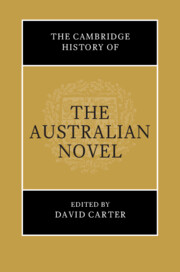Book contents
- The Cambridge History of the Australian Novel
- The Cambridge History of the Australian Novel
- Copyright page
- Contents
- Figures
- Contributors
- Acknowledgements
- Introduction
- 1 The Global Invention of the Australian Novel
- 2 Colonial Adventure Novels
- 3 Beyond Britain and the Book
- 4 Transnational Optics
- 5 The Novel in the Late Colonial Period
- 6 Love Is Not Enough
- 7 The Australian Crime Novel, 1830–1950
- 8 The Novel Nation
- 9 Selling Australian Stories to the World
- 10 Women Writers and the Emerging Urban Novel, 1930–1952
- 11 The National Trilogy and Mining
- 12 Nation and Environment in the Twentieth-Century Novel
- 13 Henry Handel Richardson, Christina Stead and the Transnational Fiction of Provincial Development
- 14 The Mid-Century Australian Novel and the End of World History
- 15 Race, Romance and Anxiety
- 16 Whiteness, Aboriginality and Representation in the Twentieth-Century Australian Novel
- 17 When the Twain Meet
- 18 From Bunyip to Boom
- 19 Unsettling Archive
- 20 The Novel at Arms
- 21 ‘Our Least-Known Best Seller’
- 22 Writing, Women and the Australian Novel
- 23 White Lies
- 24 The Economics of the Literary Novel
- 25 Mabo, History, Sovereignty
- 26 Indigenous Futurism
- 27 The Regional Novel in Australia
- 28 Children’s and Young Adult Literature
- 29 Grunge, Nation and Literary Generations
- 30 The Making of the Asian Australian Novel
- 31 Screening the Australian Novel, 1971–2020
- 32 Australian Fantasy, Crime and Romance Fiction in the Twentieth and Twenty-First Centuries
- 33 Uncertain Futures
- 34 A (Sovereign) Body of Work
- 35 The Novel Road to the Global South
- 36 The Fortunes of the Miles Franklin
- 37 The Arab Australian Novel
- 38 Riddling the Nation
- 39 Migrant Writing and the Invention of Australia
- Selective Bibliography: Studies of the Australian Novel, 2000–2021
- Index
14 - The Mid-Century Australian Novel and the End of World History
Published online by Cambridge University Press: 28 June 2023
- The Cambridge History of the Australian Novel
- The Cambridge History of the Australian Novel
- Copyright page
- Contents
- Figures
- Contributors
- Acknowledgements
- Introduction
- 1 The Global Invention of the Australian Novel
- 2 Colonial Adventure Novels
- 3 Beyond Britain and the Book
- 4 Transnational Optics
- 5 The Novel in the Late Colonial Period
- 6 Love Is Not Enough
- 7 The Australian Crime Novel, 1830–1950
- 8 The Novel Nation
- 9 Selling Australian Stories to the World
- 10 Women Writers and the Emerging Urban Novel, 1930–1952
- 11 The National Trilogy and Mining
- 12 Nation and Environment in the Twentieth-Century Novel
- 13 Henry Handel Richardson, Christina Stead and the Transnational Fiction of Provincial Development
- 14 The Mid-Century Australian Novel and the End of World History
- 15 Race, Romance and Anxiety
- 16 Whiteness, Aboriginality and Representation in the Twentieth-Century Australian Novel
- 17 When the Twain Meet
- 18 From Bunyip to Boom
- 19 Unsettling Archive
- 20 The Novel at Arms
- 21 ‘Our Least-Known Best Seller’
- 22 Writing, Women and the Australian Novel
- 23 White Lies
- 24 The Economics of the Literary Novel
- 25 Mabo, History, Sovereignty
- 26 Indigenous Futurism
- 27 The Regional Novel in Australia
- 28 Children’s and Young Adult Literature
- 29 Grunge, Nation and Literary Generations
- 30 The Making of the Asian Australian Novel
- 31 Screening the Australian Novel, 1971–2020
- 32 Australian Fantasy, Crime and Romance Fiction in the Twentieth and Twenty-First Centuries
- 33 Uncertain Futures
- 34 A (Sovereign) Body of Work
- 35 The Novel Road to the Global South
- 36 The Fortunes of the Miles Franklin
- 37 The Arab Australian Novel
- 38 Riddling the Nation
- 39 Migrant Writing and the Invention of Australia
- Selective Bibliography: Studies of the Australian Novel, 2000–2021
- Index
Summary
World War II is widely understood as the endpoint of the progressive narrative of ’World History’. The conventional critical narrative of Australia’s post-war literature, however, identifies a dominant mythopoeic tendency of quest, often bound up with narratives of colonial discovery and settlement. Through this lens, Australian literature of this period appears to be driven by the outmoded teleologies and linear imperatives that underpinned the obsolete narrative of World History. From the vantage point of the twenty-first century, however, the apparent retrogression of Australian literature appears more complex. Eleanor Dark’s The Timeless Land (1941) provides a blistering critique of the Bildungsroman in the context of colonialism and the failed quests of Patrick White’s eponymous hero in Voss (1957) and of Stephen Heriot in Randolph Stow’s To the Islands (1958), which do not repeat the narrative of European discovery so much as expose and exhaust its operations. Shirley Hazzard’s The Transit of Venus, published in 1980 but set in the period immediately after World War II, makes this process explicit and provides, inter alia, a framework for reconsidering the Australian post-war novel as a reckoning with World History that links the practices of colonialism with the catastrophe of the war.
- Type
- Chapter
- Information
- The Cambridge History of the Australian Novel , pp. 236 - 253Publisher: Cambridge University PressPrint publication year: 2023



